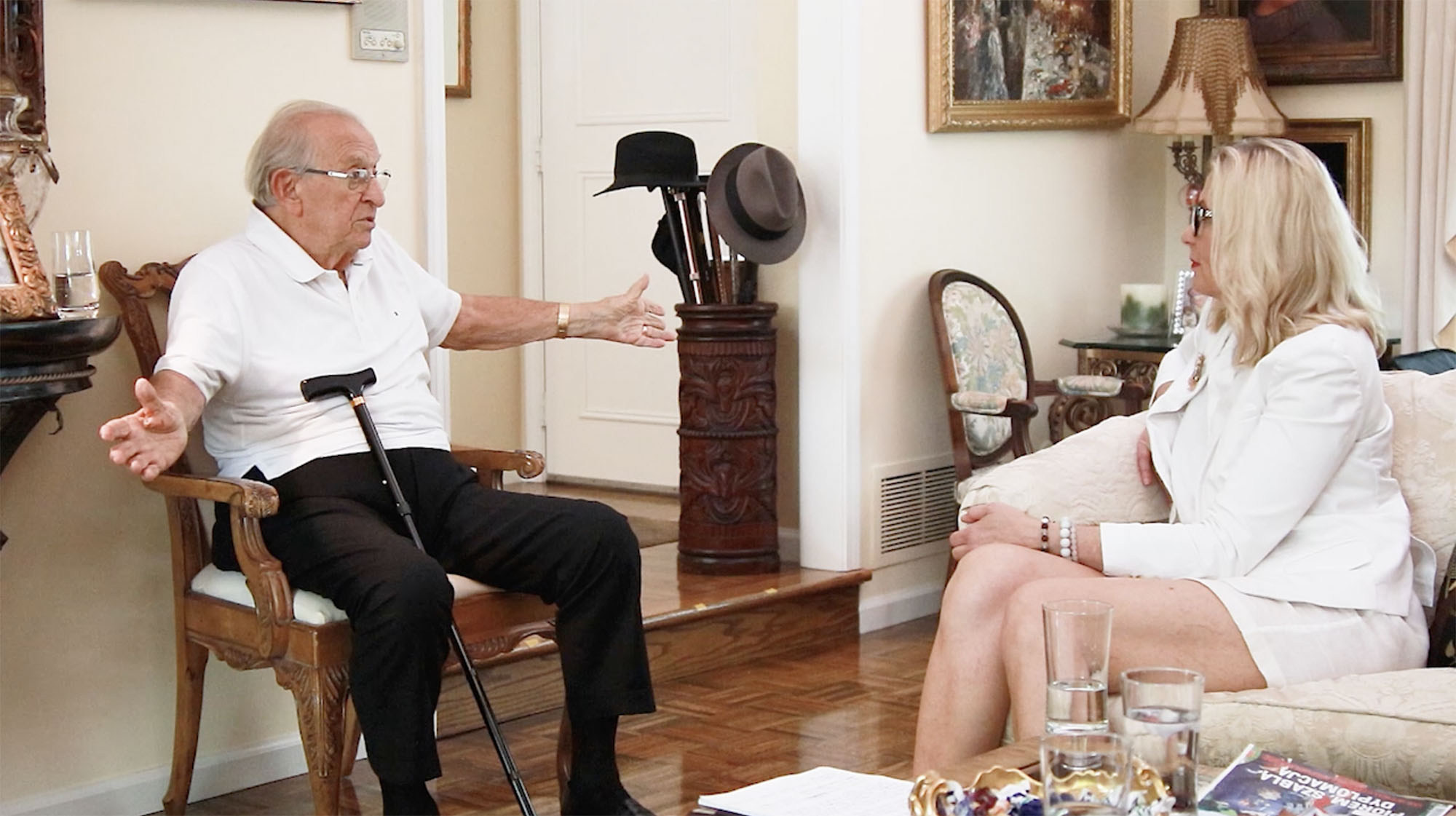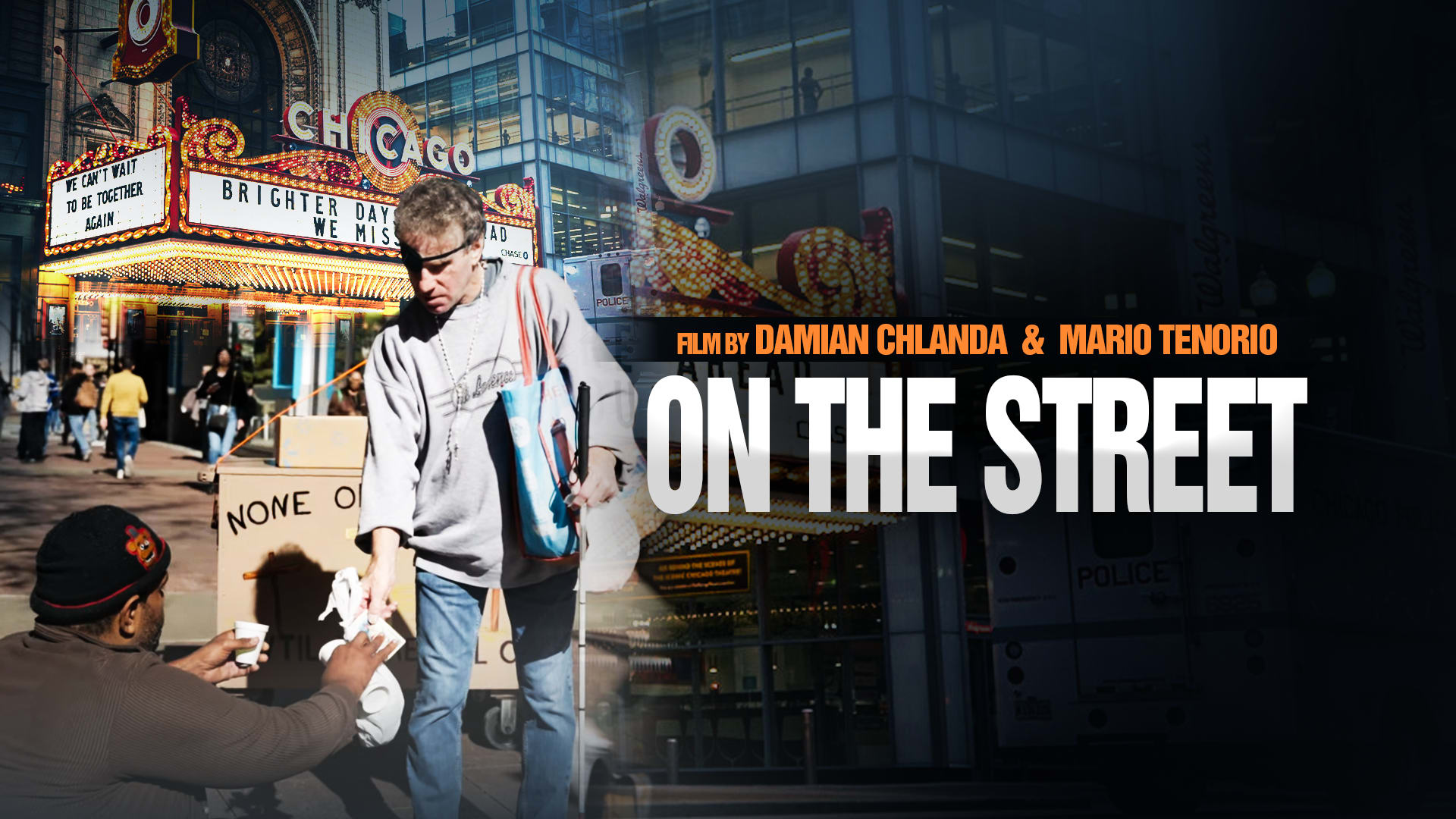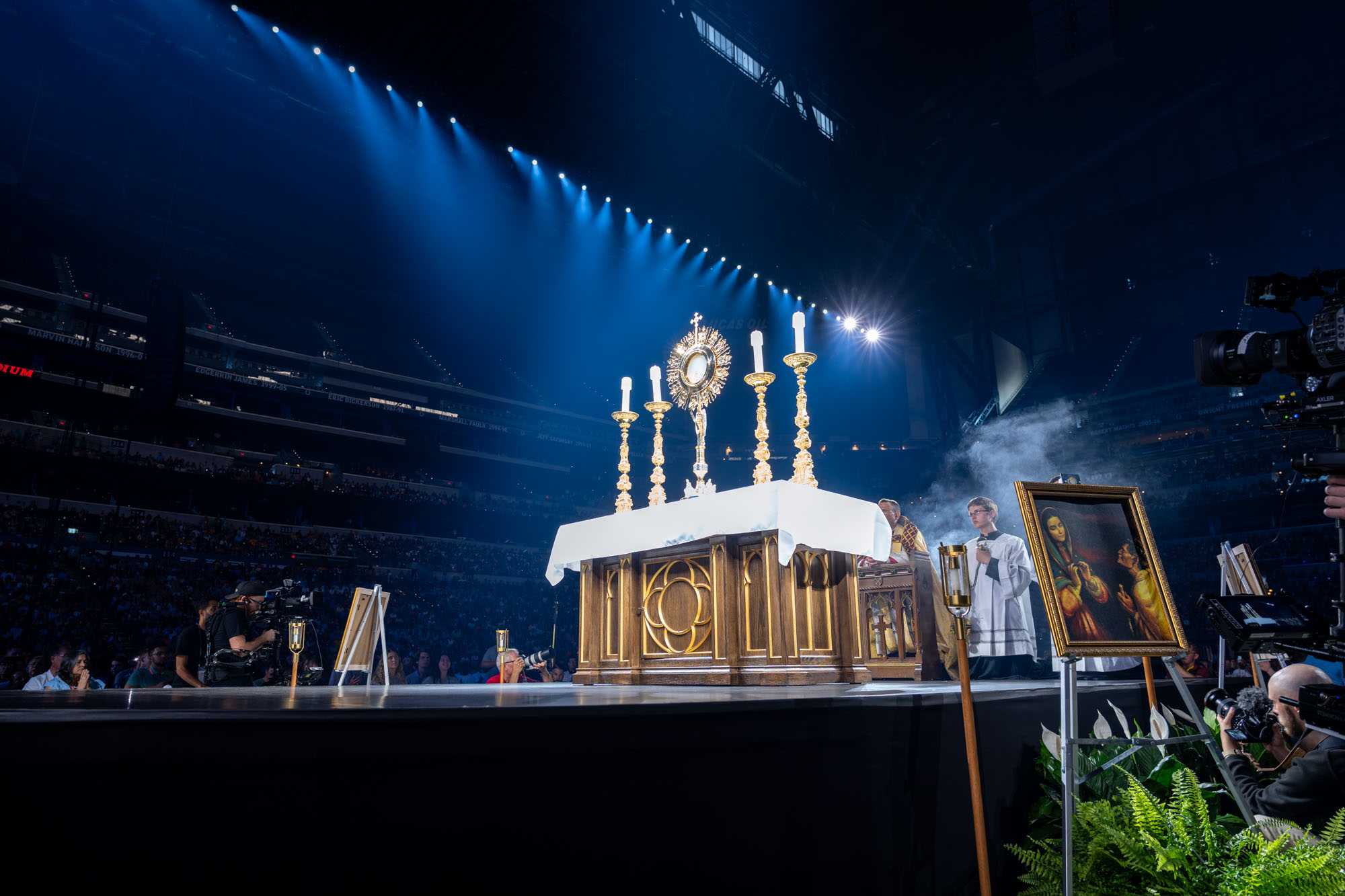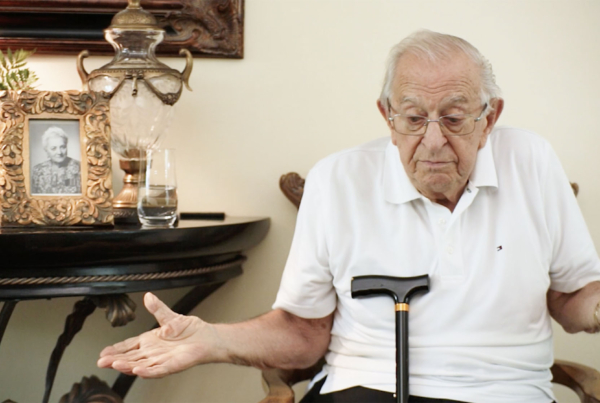Transkrypcja (english below):
Gdzie żołnierze jadą na urlop, jedni na front…
Ale jak ona się tam w ogóle znalazła, do tego Soldaten? Ano tak, Mama miała różne kontakty…
Dostała się dlatego, że pięknie po niemiecku mówiła.
Aha.
O, teraz pytanie. Pracowała przez 5 lat. Różne rzeczy znajdowałem, ukryte w łazience, których nie dotykałem, co było, jak było… Jak przyniosła ulotkę, to mówiła tatusiowi: „Tatuś, starzyzną zachorował znów zachorował”. Zawsze był w łóżku. Mówiła mu, że znalazła to w tramwaju. Wojna się skończyła, nie dowiedziałem się. Parę razy odwiedziłem ją w Polsce, nie dowiedziałem [się]. O, przede wszystkim, [jak] szedłem do niewoli. Patrzyłem się na nią tak długo, żeby mi powiedziała.
Nie powiedziała.
Do dzisiejszego dnia [nie wiem]. To jest konspiratorka, własnemu synowi [nie powiedziała]. Ale powiem ci, jak mnie chowała? Tak, jak gdzie kiedyś powiedziała, że nie powiem, tak nie powiedziała. Umarła, nie wiem, dla kogo pracowała, dla jakiej organizacji.
Dlatego ty też teraz nie powiesz, dla jakiej organizacji pracowała.
Nie wiem!
O, naprawdę?
Naprawdę nie wiem. Nigdy mi nie powiedziała.
Ale twoja organizacja, też powiedziałeś, że nie powiesz.
To tak jakoś w rodzinie jest. W każdym razie to było niesamowite, niesamowite. Przede wszystkim wiecie, że Niemcy dużo razy odwiedzali mój dom. Wpadli pewnego razu zimą, nie będą mówił, w jakim roku. Wpadają, jeden pokój tylko mieliśmy, tylko jadalnia i sypialnia, bo kuchnia była osobno. Powybijali karabinami okna, czegoś szukali. Tatuś ze swoim Hochdeutschem, niemieckim, którego oni nie słyszeli, mówi: „Panowie…”
A skąd tatuś umiał po niemiecku? Aha, bo był w tej szkole w Monachium?
„Panowie, wy jesteście w cywilizowanym kraju, tu jest taki contrabion [przyrząd] co podnosicie do góry i okno sie samo roztworzy.? A oni szukali broni.
Aha.
Tylko spojrzał, to przecież jak widział że śnieg, kto by chował tam broń potym.
Tak, tak.
A Niemcy przyszli któregoś dnia. Oczywiście znów nie ma mnie. Dali mamie karteczkę, żeby się zgłosiła. Mama więc jak zwykle wzięła już ze sobą palto na Szucha. Mówię tak, jak mi zostało powiedziane. Nic nie dodaję, nic nie ujmuję. Ten esesman podniósł się zza biurka, powiedział do niej: „Nehmen Sie Platz, Rapczyńska”. Zaczyna rozmowę i mówi tak… Co prawda tego samego triku po wojnie używał polski kapitan, ale on mówił tak: “Pani jest odznaczona Krzyżem Niepodległości z Mieczami.” A ona mówi: „Tak, ale to było z caratem”. „O, my wiemy, my wiemy”.
Ten Niemiec?
Tak.
A skąd on wiedział, że Mama była odznaczona? Wszystko wiedzieli?
Właśnie o tym mówię. I mówi do niej tak: „Ty należysz do takich kobiet, matek polskich, żebyś dała sobie rękę do łokcia obciąć, ale byś nie powiedziała. Ale jakbyśmy go chcieli, no to byśmy go mieli, bo on jest w Zamościu.”
Byłeś w Zamościu?
Byłem w Zamościu. Uciekłem z jednego schowania [jednej kryjówki], dlatego, że dziewczynka przyszła, córka dozorcy, oparła się o piec, który był zaraz koło drzwi i tak do mnie powiedziała, słowo w słowo: „Panie ładny, mnie się zdaje, że o pana się policja pyta”. Akurat Mamusia wyszła, przyniosła mi kawałek wędzonej ryby w pergaminie za tego [zawiniętej], jesionkę z tego, już jestem na Okopowej i już bocznymi drogami daję dyla. I to 5 lat, jak uciekałem. OK, to w tym wypadku taka była historyjka. Jak to usłyszała, to wskoczyła do dorożki i mówi: „Niech pan nie zabije konia, ale niech pan mu da takie, ja muszę koniecznie dojechać do telegrafów na Poznańską”. Teraz Mama opowiadała: „Wchodzę tam, te panienki są w niebieskie mundurki poubierane. Popatrzałam –buzia musi być polska i taka ładna. Złapałam ją za rękawy, przyciągnęłam ją pod ścianę i mówię: „Proszę pani, jest pani taka ładna, a ja mam takiego ładnego syna. Niech zabiją mnie tutaj. Ja potrzebuję dać telegram do…” Gdzie byłem?
Do Zamościa.
Ona mówi: „Ja poślę liniami niemieckimi”. Ja byłem w takim malutkim pensjonaciku, akurat byłem w domu. Puka chłopak, ja już mu nie otwieram. Mówi, że: „Jest telegrama tutaj dla pana”. Czytam telegram: „Niesamowite jest nieszczęście w naszej rodzinie. Ciocia Kuszkowska jest ciężko chora.” [A] ciocia Kuszkowska już nie żyje od roku.
Aha. Czyli wiedziałeś momentalnie, że miejsce jest trefne.
Teraz inne. Z powodu tego, że on miał… O, jak ja się dostałem tam. Jak ja uciekam od tej dziewczynki, na Alejach Jerozolimskich dochodzę do Żelaznej. Przed Żelazną były takie trzy małe magazyny, a w jednym z nich robili papę na dach. Dorwałem się gdzieś tam około godziny piątej, bo [szedłem] nocą, z bramy do bramy. Się nachodziłem w życiu, teraz kuleję! Wszedłem tam, to już była piąta – szósta godzina, taki staruszek zamiata miotłą przed tym budynkiem, co tam był, taką naszą miotłą, co to takie długie patyki [ma] i tak zamiata. Ja zaszedłem za niego, trochę poczekałem, aż to wszystko pozamiata, podszedłem do niego i mówię tak, A ja na Twardej to byłem tylko przez most i dwa bloki, jeden blok w drugą stronę i jestem tam. Ja mówie: “Tu jest, moja Mama tam mieszka” – mówię. – „Na pewno pana bardzo wynagrodzi. Czy byłby pan taki uprzejmy, że pan da znać, że ja jestem?” On mówi: „Tak, pójdę”. I poszedł. Ale nikomu się nie wierzy, więc ja już wlazłem na dach tej szopy do samego parkanu. Bo tam był wielki parkan po jednej i po drugiej stronie, a po drugiej stronie ulicy był Szpital Dzieciątka Jezus. Jakbym tam wskoczył, to armia by mnie nie znalazła, bo to niesamowite tereny były, budynki i ogrody itd. Ale przygotowany byłem. On przyszedł, Mama przyszła i mówi tak, w tym wypadku mówi tak… Jeszcze parę tych wypadków było, ale w tym przypadku się zakończyło w ten sposób. Mówi tak: „Wiesz co…”… Jeszcze muszę powiedzieć o jednym. Schowała mnie jakimś cudem na Chmielnej 128, w takim wąskim jak korytarz pokoju. Jakoś ciemno niesamowicie, tylko widziałem tę osobę snującą się. Ja tam byłem przez jakieś 2,5 miesiąca. Nie wolno mi było podejść do okna, tylko w nocy. I ja tak robiłem, otwierałem okno i oddychałem.
Jak długo tam siedziałeś, na tym…?
Dwa i pół miesiąca. Za każdym razem, jak byłem w Polsce z Basią, szedłem tam na górę i wkładałem 100 dolarów pod te drzwi. Nigdy te drzwi nie były otwarte, nigdy nie widziałem [nikogo]. Stukałem oczywiście. Tak teraz mówię, że mogłaby mnie zrobić sławnym. Jak ja otwierałem to okno i oddychałem, to usłyszałem brzęk metalu. Wychyliłem się lekko i popatrzyłem, że to są jakieś metalowe rzeczy i metalowe rury. A w tym [numerze] 128 wejście do piwnicy nie było z klatki schodowej, tylko było od podwórka, takie drzwi się…
…od zewnątrz.
I tam oni to wkładali. Ale to muszę postrzępić, ale nie chcę, ale tak jest. W każdym razie kończymy z tym, z tą… proszę się przypomnieć, żebym wrócił do tych rur. „Tadziku, naprawdę, wierz mi. Jesteś spalony. Jesteś spalony, nie mogę narażać tych ludzi na prowincji, ostatnia nadzieja twoja to jest powiem ci czemu.”
Transcription:
Where soldiers go on holidays, some go to the front…
And how did she get there, to that Soldaten? Oh yes, she had different contacts…
She got there because she spoke fluent German.
Right.
And now the question is, she had worked for 5 years. I would find different things hidden in the bathroom, which I wouldn’t touch, what was there, how it got there… When she brought in a brochure she would tell daddy: “Daddy, the old man got sick again, he got sick again”. He was always in bed. She told him that she found it on the tram. The war ended, I didn’t know. I visited here in Poland a few times, I didn’t know. And most of all, when I got captured. I would look at her so long so that she told me.
She didn’t say.
To this day [I still don’t know]. She was a conspirer, she wouldn’t [tell] to her own son. But I’ll tell you, how she would hide me? As she once said she wouldn’t tell, she didn’t. She died and I don’t know whom she had worked for, what organization.
So that’s why you now won’t tell what organization she had worked for.
I don’t know!
Oh, really?
Really, I don’t know. She never told me.
But your organization, you also said you won’t tell.
It runs in the family I guess. Anyway, it was incredible, incredible. Most of all, you know that the Germans came to my house many times. Once they raided it in the winter, I won’t tell you which year that was. They dropped in, we only had one room, a dining room and bedroom, with a separate kitchen. They broke windows with rocks, they were looking for something. Dady with his Hochdeutsch, the type of German they had never even heard, says “Gentlemen…”
And where had your dad learned to speak German? Oh, he went to that school in Mannheim?
“Gentlemen, you are in a civilized country, there is this thing here, you pull it up, and the window open. They were looking for guns.
Right
He just looked, he could see snow. Who would hide weapons in that?
Yes, yes.
But the Germans came one day. Of course, again, I wasn’t there. They gave mom a piece of paper, for her to come in. So she took her coat and went to Szucha Av. I say as I was told. I give or take nothing of my own. That SS officer rose from behind his desk, he said “Nehmen Sie Platz, Rapczyńska”. That’s how he started… actually a Polish captain used the same trick after the war, but he would say: “You’re decorated with an Independence Cross with Swords.” An she would reply “yes, but that was with the Tzar”. “Oh, yes, we know that”.
That German?
Yes.
And how would he know that your mom was decorated? Did they know everything?
That’s what I said. And he said: “You’re one of those women, Polish mothers, you would let us cut your arm at the elbow, but you wouldn’t say. But if we wanted him, we would get him, because he is in Zamość.”
Were you in Zamość?
I was in Zamość. I ran from one hiding place because a girl came by, the keeper’s daughter, and she said “Mr handsome, I think that Police is asking about you”. Mom just walked out, she brought me a piece of smoked fish wrapped in paper, a coat, I’m already in Okopowa and I run through the back streets. It’d been five years since I went into hiding. OK, in this case, this was how the story went. When she heard it, she jumped into a coach and said “Don’t kill your horse but make it run, I have to get the telegraph at Poznańska St.” Now mom said: “I walk in, those ladies wearing blue uniforms. I looked – the face had to be Polish, so nice. I grabbed her by the arms, pushed against the wall and I say: “Miss, you’re so beautiful, and my son is so handsome. Let them kill me, but I have to send a telegram to…” where was I?
Zamość
And she says: “I’ll send it using the German lines”. I was in this little boarding hose. A boy knocks on the door, but I don’t open it to him anymore. He says: “There’s a telegram here for you”. I read the telegram: “A great family tragedy has happened. Aunt Kuszkowska is severely ill.” Aunt Kuszkowska had been dead for over a year.
Right. So you immediately knew that the place was burnt.
Now another one. Because he had… oh when I got there. I ran from that girl, in Jerlozolimskie Av. I walked to Żelazna. Before Żelazna there were these three small warehouses, they made roofing felt in one of them. I got there some time about five, because I walked through the night, from one gate to another. I walked so much in life, that now I’m limping! I walked in, it was five – six o’clock already, an elderly guy sweeps the floor in front of the building with a broom, like one we used, one with a long stick. I walked from behind, waited for him to finish sweeping, I walked up to him and said I lived in Twarda, across the bridge and two blocks away, one block across and I’m there. I say: “here it is, my mom lives here, she will surely reward you for this. Could you please be so kind and let her know I was here?” And he said: “Yes I will go”. And he did go. But you don’t trust anyone, so I walked up to the roof of that warehouse up to the fence. There was a tall fence on one side and on the other, and on the other side, there was the Baby Jesus Hospital. If I jumped in there the soldiers would not find me, because these were some vast areas with buildings, gardens, etc. But I was prepared. He came, mom came and says… there were some other cases, but it always ended the same. She says: “you know what….” I have to mention another thing. By some miracle, she had me hidden in Chmielna 128, in a room as narrow as a corridor. Very dark, I could just see a person wandering. I was there for some 2,5 months. I couldn’t walk up to the window, only at night. And so I did, I opened the window to breathe.
How long were you there?
Two and a half months. Each time when I was in Poland with Basia, I would walk up there and put a hundred dollars under that door. The door would never open, I never saw anyone. Of course, I knocked. Now I say this because that person could make me famous. When I opened that window to breathe, I heard a metallic sound. I leaned out a bit and saw some metal things, pipes. And at 128 the entrance to the basement wasn’t from the staircase but from the courtyard, through these doors…
… from the outside.
They would put it there. I have to waste some breath, but I don’t want to, so it was. Anyway, let’s wrap it up. Remind me to get back to those pipes. “Tadzik, really, believe me. You are burnt. You are burnt, I can’t endanger the people in the countryside, it’s your last hope, I’ll tell you why.”










